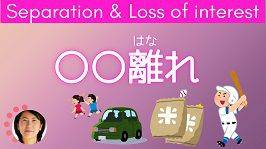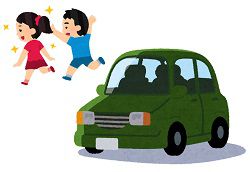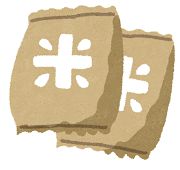Blogs edited and submitted by Chiho Kamioka
JOI Support staff and manager.
Separation & Loss of interest

Changes in Japanese society
Japan as a nation is an ever-changing landscape of influences and shifts in fashions and tastes. The changes are often brought about by the younger population and from abroad, but some changes are just brought about by time.
In this blog for Japanese readers, Japanese teacher Ayako Suzuki deals with the changing tastes of the Japanese people and one Japanese phrase that is often used when talking about this topic. Please listen to the audio of the blog in the YouTube video, and practice listening for the JLPT and for your Japanese learning for free.
〇〇離れ
Separation & Loss of interest

By SUZUKI Ayako
「〇〇離れ」という言い方があります。これには、①〇〇に興味・関心がなくなる[政治離れ、活字離れなど]、②〇〇から独立する[子離れ、親離れなど]、③〇〇から、かけ離れている[人間離れ、日本人離れなど]の3つの意味があります。〇〇にはいろいろな言葉を入れることができますが、今回は、ここ数年メディアなどでよく取り上げられている、①の意味での日本人の「〇〇離れ」を3つ紹介します。
まず、「車離れ」です。自動車に乗る機会や車を所有する人が以前より減っているという意味で使われます。日本の経済を支えている産業の1つに自動車産業がありますが、近ごろの日本では車の所有率が減っていて、特に“若者の車離れ”が進んでいると言われています。

次に、「コメ離れ」です。日本の米の消費量は年々減っています。日本人の主食はお米ですが、食の多様化によりパンやパスタなどを主食にすることが増えたことや、朝食を食べる人が減ったことなどが要因だと考えられています。

最後に、「野球離れ」です。日本では野球はとても人気があるスポーツですが、野球以外のスポーツの選択肢が増えたこともあり、野球を選ぶ子供が減ってきています。また、野球ができる場所の減少、他のスポーツより練習時間が長いことなども野球離れの原因に挙げられています。

「〇〇離れ」はネガティブなイメージがある表現ですが、私たちの興味が多様化している現代の社会では、「〇〇離れ」が起きるのは当然のことなのかもしれません。
To listen to this blog, please watch our Youtube video.
「〇〇離(ばな)れ」という言(い)い方(かた)があります。これには、①〇〇に興味(きょうみ)・関心(かんしん)がなくなる[政治離(せいじばな)れ、活字離(かつじばな)れなど]、②〇〇から独立(どくりつ)する[子離(こばな)れ、親離(おやばな)れなど]、③〇〇から、かけ離(はな)れている[人間離(にんげんばな)れ、日本人離(にほんじんばな)れなど]の3つの意味(いみ)があります。〇〇にはいろいろな言葉(ことば)を入(い)れることができますが、今回(こんかい)は、ここ数年(すうねん)メディアなどでよく取(と)り上(あ)げられている、①の意味(いみ)での日本人(にほんじん)の「〇〇離(ばな)れ」を3つ紹介(しょうかい)します。
まず、「車離(くるまばな)れ」です。自動車(じどうしゃ)に乗(の)る機会(きかい)や車(くるま)を所有(しょゆう)する人(ひと)が以前(いぜん)より減(へ)っているという意味(いみ)で使(つか)われます。日本(にほん)の経済(けいざい)を支(ささ)えている産業(さんぎょう)の1つに自動車(じどうしゃ)産業(さんぎょう)がありますが、近(ちか)ごろの日本(にほん)では車(くるま)の所有率(しょゆうりつ)が減(へ)っていて、特(とく)に“若者(わかもの)の車離(くるまばな)れ”が進(すす)んでいると言(い)われています。
次(つぎ)に、「コメ離(ばな)れ」です。日本(にほん)の米(こめ)の消費量(しょうひりょう)は年々(ねんねん)減(へ)っています。日本人(にほんじん)の主食(しゅしょく)はお米(こめ)ですが、食(しょく)の多様化(たようか)によりパンやパスタなどを主食(しゅしょく)にすることが増(ふ)えたことや、朝食(ちょうしょく)を食(た)べる人(ひと)が減(へ)ったことなどが要因(よういん)だと考(かんが)えられています。
最後(さいご)に、「野球離(やきゅうばな)れ」です。日本(にほん)では野球(やきゅう)はとても人気(にんき)があるスポーツですが、野球(やきゅう)以外(いがい)のスポーツの選択肢(せんたくし)が増(ふ)えたこともあり、野球(やきゅう)を選(えら)ぶ子供(こども)が減(へ)ってきています。また、野球(やきゅう)ができる場所(ばしょ)の減少(げんしょう)、他(ほか)のスポーツより練習時間(れんしゅうじかん)が長(なが)いことなども野球離(やきゅうばな)れの原因(げんいん)に挙(あ)げられています。
「〇〇離(ばな)れ」はネガティブなイメージがある表現(ひょうげん)ですが、私(わたし)たちの興味(きょうみ)が多様化(たようか)している現代(げんだい)の社会(しゃかい)では、「〇〇離(ばな)れ」が起(お)きるのは当然(とうぜん)のことなのかもしれません。
Separation & Loss of interest
There is a term called "something ‘banare’". This has three meanings: (1) losing interest in something (i.e., losing interest in politics, losing interest in the printed word, etc.), (2) becoming independent from something (i.e., letting your children grow independently, becoming independent of parents, etc.), and (3) becoming far removed from something (i.e., removing oneself from other people, separating oneself from Japanese people, etc.). There are many different words that can be added instead of the "something " phrase, but in this article, I would like to introduce three phrases that have been frequently mentioned in the media over the past few years.
First of all, there is the "kuruma banare - shift away from cars". This term is used to describe the fact that fewer people drive and own cars than ever before. One of the industries that support the Japanese economy is the automobile industry, but in recent years, car ownership in Japan has been declining, especially among young people.
Secondly, there is the "kome banare - shift away from rice". The consumption of rice in Japan is decreasing year by year. Although rice is the staple food of the Japanese people, it is thought that this is due to an increase in the use of bread and pasta as staple foods due to the diversification of the diet and the fact that fewer people eat breakfast.
Finally, there is the "yakyuu banare - separation from baseball". Baseball is a very popular sport in Japan, but fewer and fewer children are choosing to play it, partly because there are now more sports to choose from. There are also fewer places to play baseball and longer practice sessions than in other sports.
The phrase "something ‘banare’" has a negative connotation, but in today's society, where our interests are increasingly diverse, it is perhaps not surprising that "something ‘banare’" is occurring.
かけ離(はな)れる be very far apart from; be remote; be quite different from
消費量(しょうひりょう) amount of consumption
主食(しゅしょく) staple food
多様化(たようか) diversification
選択肢(せんたくし) choices; alternatives; options
Konnichiwa. My name is Ayako Suzuki.
I live in Tochigi prefecture with my husband and two children. Tochigi has two towns that are very popular tourist attractions; Nikko, which is famous for its World Heritage shrine and its wonderful nature, and Mashiko which is famous for its pottery. Its only two hours by train from Tokyo, so if you get that chance, please come and visit Tochigi.
Through the language of Japanese, I am happy to and looking forward to meeting you all. Lets study Japanese together.


